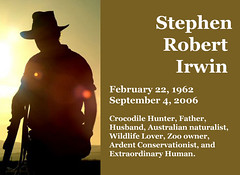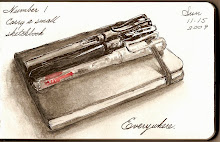
Steve Irwin, Crocodile Hunter and Human Extraordinaire: 1962 -2006
Originally uploaded by lorenzodom.
Malinda
Steve Irwin, Crocodile Hunter and Human Extraordinaire: 1962 -2006
September 5, 2006:
The death of Steve Irwin is not as tragic as many media pundits are purporting it to be.
Far from, for how many of us have the courage, the tenacity and the integrity to do exactly what we love doing, everyday, regardless of the risks and the ridicule, regardless of the perils of the unknown?
Not many.
But Steve certainly did, and he died well knowing of the dangers involved in executing his greatest passion. That is not tragic, that is triumphant.
Granted, I’m sure he, his family and all his fans around the world would have preferred that he had lived a lot longer.
Alas, when a man looks fate straight in the eye and even vies to wrestle with it, and when an indifferent and amoral species, such as the mortal stingray that killed Steve on Monday by piercing him directly in the heart, as it reacted out of primal fear—he, nor we, should be surprised.
Zoo owner, star of several documentaries on Animal Planet and the Travel Channel, ardent conservationist, and business entrepreneur, Steve Irwin understood what it took to succeed; he understood the perseverance, the passion, and the peril that he faced often, if only because he wanted to teach and inspire others not to fear living life to its fullest.
Fearless in so many ways, Steve was still known to have a more vulnerable, human side to him. For he is reported to have said, “Getting married was the scariest moment of my life.”
Nonetheless and allthemore, the fact is, Steve likely died as he had hoped, maybe a little earlier than he had anticipated, but certainly in as grand a manner as his gall, his showmanship, and his exemplar exuberance had together deemed what was ultimately the most apropos way to go, for this extraordinary man, this extraordinary human, and this extraordinary lover of (wild) life.
The End Is Not So Horrible, If You Know How To Get There *
Immediately after Niezstche's Zarathustra gives his prologue, the tight rope walker carrying on above Zarathustra and the onlooking town folk—plunges to his death.
The following conversation ensues between Zarathustra and the fallen, prior to the latter's last breath:
“By my honor, friend,” answered Zarathustra, “all that of which you speak does not exist: there is no devil and no hell. Your soul will be dead even before your body: fear nothing further.”
The man looked up suspiciously. “If you speak the truth,” he said, “I lose nothing when I lose my life. I am not much more than a beast that has been taught to dance by blows and a few meager morsels.”
“By no means,” said Zarathustra. “You have made danger your vocation; there is nothing contemptible in that. Now you perish of your vocation: for that I will bury you with my own hands.”
To die by one's vocation.
That is perhaps the highest form of passion. To live and perish in the thrill of one's purpose and the moments that made life meaningful for that individual. That is the ultimate form of living.
Perhaps, it is living dangerously, but it is also living.
How many heroes have done much the same? Those we hold in the highest esteem live and die by that which they know to be their calling.
9.11 and the bold acts of all the municipal servicemen that perished is a poignant example.
But just the same, the likes of the greatest artists, writers, scientists, entrepreneurs and other elite minds and imaginations who died of old age are equally laudable, if only because they held their course in life, they overcame obstacles and defeated monsters, and outwitted conformity, complacency and their seven ugly sisters: jealousy, envy, virtue, materialism, righteousness, apathy, and the unknown.
“Don't waste your time on jealousy. Sometimes you're ahead, sometimes you're behind. The race is long and, in the end, it's only with yourself.”
- Mary Schmich -
The greatest journeys are always alone and end with death, which is why the journey itself should be the ultimate goal. Fulfillment comes with the fulfilling. If you constantly are looking to go somewhere in order to achieve happiness, you'll really never get there.
“That's the message of the myth. You, as you know yourself, you are not the final term of your being. And you must die to that, one way or another—giving of yourself to something or in being annihilated, actually, physically—to return, you might say, or to recognize (that) life is always on the edge of death—always. And one should lack fear, and have the courage of life. That's the principle initiation of all of the heroic stories.”
- The Power of the Myth, Joseph Campbell -
And so my fellow photographers, kin spirits, adventurers, lovers of life, Make Every Shot Count, position yourself well, and then click before you’ve lost the nerve.
Life is fleeting, as are all the fine moments that cumulatively constitute our existence.
So fear not! Most of the time you won’t get hit or the person you’re aiming your camera at really won’t care (especially after you walk away).
“The choice to live our passion is not dangerous,
it is much worse, it is unknown.
But what is known can never be new or creative.
If we die in our passion, at least we have lived,
if we live in the known we have already died.”
-Steven Harrison-
Decicated in memory of Steve Irwin, Crocodile Hunter and Human Extraordinaire: 1962 -2006
*Excerpted from the upcoming book 25 Lessons I Have Learned, to be published by Cyan Books in the Spring of 2007.
Uploaded by lorenzodom on 5 Sep '06, 5.33pm PDT.

